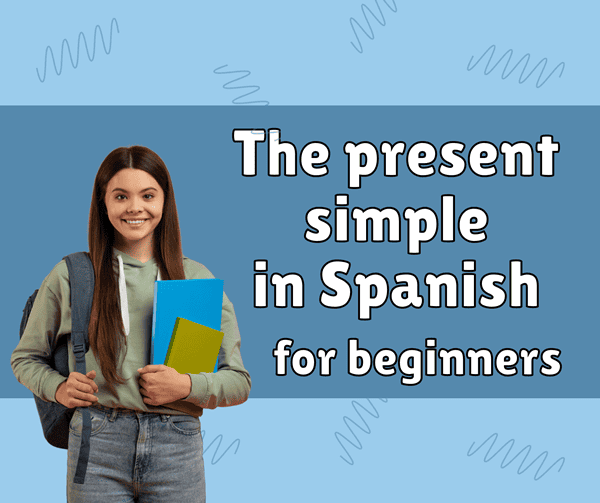So, you’ve decided to learn Spanish? ¡Genial! Let’s start with one of the most important foundations: the present simple tense, or as we call it in Spanish, el presente de indicativo.
This is the tense you’ll use every day—to talk about routines, facts, likes and dislikes… basically, it’s your daily bread when speaking Spanish.
Don’t worry if you’re totally new. I’ll guide you step by step. Ready? ¡Vamos!
What is the Spanish present tense?
The present simple tense in Spanish is used to talk about:
- Habits or routines → Yo estudio español todos los días. (I study Spanish every day.)
- Facts and general truths → El sol sale por el este. (The sun rises in the east.)
- Emotions and opinions → Me gusta el chocolate. (I like chocolate.)
- What’s happening right now (sometimes) → Estoy cansado. (I’m tired.)
💡 Unlike English, Spanish verbs change their endings depending on the subject. That’s called conjugation.
How Spanish verbs work: the basics
In Spanish, infinitive verbs (like “to speak”, “to eat”, “to live”) end in -ar, -er or -ir.
Here are three regular verbs we’ll use as examples:
| Infinitive | Meaning | Verb type (conjugación) |
|---|---|---|
| hablar | to speak | -ar |
| comer | to eat | -er |
| vivir | to live | -ir |
Subject pronouns in Spanish
Let’s meet the “doers” of the action (subject pronouns). These are optional in Spanish, but useful for beginners:
| Spanish | English |
|---|---|
| yo | I |
| tú | you (informal) |
| él – ella – usted | he – she – you (formal) |
| nosotros/as | we |
| vosotros/as | you all (informal – Spain only) |
| ellos/as – ustedes | they – you all (formal) |
Regular verb conjugation in the Present Tense
Let’s see how regular verbs in Spanish work. When you conjugate a verb, you change its ending to match the subject (the person doing the action). In English, we do this too — think about the verb to speak:
- She speaks
- I speak
In Spanish, this happens more often and more visibly, because almost every subject has its own verb ending.
The basic rule:
All regular verbs in Spanish follow a pattern based on their endings:
-
–AR (e.g. hablar – to speak)
-
–ER (e.g. comer – to eat)
-
–IR (e.g. vivir – to live)
Here’s the process in 3 simple steps:
-
Take the infinitive (like hablar)
-
Remove the ending (-ar, –er, –ir) → you get the “stem” (habl-)
-
Add the correct ending depending on the subject.
For example:
-
yo → hablo
-
tú → hablas
-
nosotros → hablamos
Each regular verb group (-AR, –ER, –IR) has its own set of endings, and once you learn them, you can conjugate hundreds of verbs!
Tip: Spanish often drops the subject pronoun because the verb ending already tells you who is doing the action. So instead of saying yo hablo, many speakers just say hablo.
Verbs ending in -AR (First conjugation)
| Pronoun | Conjugation | Example |
|---|---|---|
| yo | hablo | I speak |
| tú | hablas | you speak |
| él / ella / usted | habla | he/she/you (formal) speak |
| nosotros/as | hablamos | we speak |
| vosotros/as | habláis | you all speak (Spain) |
| ellos / ellas / ustedes | hablan | they/you all speak |
Verbs ending in -ER (Second conjugation)
| Pronoun | Conjugation | Example |
|---|---|---|
| yo | como | I eat |
| tú | comes | you eat |
| él / ella / usted | come | he/she/you (formal) eat |
| nosotros/as | comemos | we eat |
| vosotros/as | coméis | you all eat (Spain) |
| ellos / ellas / ustedes | comen | they/you all eat |
Verbs ending in -IR (Third conjugation)
| Pronoun | Conjugation | Example |
|---|---|---|
| yo | vivo | I live |
| tú | vives | you live |
| él / ella / usted | vive | he/she/you (formal) live |
| nosotros/as | vivimos | we live |
| vosotros/as | vivís | you all live (Spain) |
| ellos / ellas / ustedes | viven | they/you all live |
As you see, only the endings change. The root stays the same (habl-, com-, viv-).
Quick tips to master the present tense in Spanish
Mastering the present tense takes practice, but don’t worry — it’s easier than it seems once you spot the patterns. Here are some quick, practical tips to help you use regular Spanish verbs with confidence from day one:
- Focus on one verb type (-ar, -er, -ir) at a time.
- Practice with common verbs: hablar, comer, vivir, trabajar, estudiar, leer, escribir…
- Repeat out loud. Train your ear and your tongue!
- Make mini sentences about daily life:
- Yo estudio español.
- Tú trabajas mucho.
- Nosotros vivimos en Madrid.
- Ellos comen pan.
